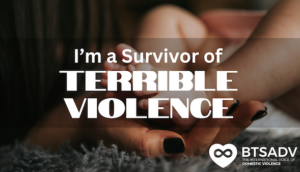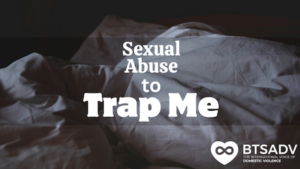Domestic violence (DV) can affect anyone of all races, genders, age, and sexual orientation. The CDC reports that one in every seven men in the U.S. over the age of eighteen are a victim of DV. The actual statistics may be even more, as men are far less likely to report instances of domestic violence (which may be because of societal stigmas that socialize men to not be vulnerable or seen as victims). In this blog, we will explore the different traumas that men may face as victims and how they relate to domestic violence. Including: post-traumatic stress disorder (PTSD), anger issues, anxiety, depression, eating disorders, and substance abuse.
Psychological Effects
Men tend to suffer psychologically when subjected to domestic violence. Post-traumatic stress disorder (PTSD) is a mental health condition that typically follows a traumatic event. PTSD can affect one’s daily living by triggering memories or flashbacks, causing one to be avoidant when it comes to their feelings, having negative thoughts, isolating oneself, memory problems, being easily frightened/startled, and having trouble sleeping. With all these effects, it is easy to see how many other challenges can unfold.
Additionally, anxiety and depression are two mental health issues that often go hand-in-hand for victims of the domestic violence cycle. Perpetrators of DV are typically looking for control and this desire to be in charge causes the victim to feel dependent on their abuser. With dependency comes a lack of self-esteem and low self-confidence that belittles how one views themselves. This control-dependence-abuse cycle causes psychological damage.
Men can also develop anger issues, as anger and trauma are linked. When personal boundaries are crossed or violated, there is a follow-up of persistent anger. When someone is violated emotionally, mentally, physically or psychologically, a certain ‘survival instinct’ takes over, and that is associated with anger. Anger management is hard to deal with when things progress over long periods of time, such as in a domestic violence relationship.
Physical Health Problems
Following the psychological factors, it is not far off for men to develop physical health problems. Issues such as eating disorders, substance abuse, and isolation from others are examples of the unhealthy coping mechanisms prevalent among male victims of domestic violence.
Eating disorders often stem from vulnerability. Being verbally and/or mentally abused may cause someone to adopt unhealthy eating habits as a way of feeling in control of their own lives again. Ultimately, this causes further harm to the victim.
Substance abuse also ties in directly with domestic abuse – many men often look for an escape, as leaving a DV relationship is not an easy task. Substance abuse numbs the emotional turmoil, but cannot address the true source of the problem.
Isolation from the outside world is also extremely common in these situations. A male victim of abuse may self-isolate out of a sense of shame due to his situation. The abusive partner may not allow the other to do certain things or has belittled their confidence so much that they have completely disconnected from their environment. Isolation leaves a victim without resources to improve or escape the situation.
Societal Factors
Many people incorrectly think that men cannot be victims and, therefore, don’t report the abuse. In society, men are often taught to be strong and to hold things together. This stigma causes issues when we think on a large scale about domestic violence. Coming forward to ask for help or to state a claim may be more difficult for a man to do because of the fear that either he will not be believed, he could be shamed, or that he won’t be taken seriously. This opens the gates for men to internalize their struggles in order to avoid appearing vulnerable.
The stereotypes that surround men encourage them to downplay the abusive situation. The man is seen by society as someone who wouldn’t be the victim of a domestic violence case. This can be hacked down to our images around masculinity. Especially in instances of DV, society views victimization as emasculating which, in and of itself, can lead to even more psychological issues for male victims. With this thought process as a society, we are inadvertently belittling a physical and mental health crisis that is very prevalent in the lives of men today.
It is difficult to assess everything that occurs when a man is a victim of domestic violence because of how underreported and misunderstood it is. Men are often reluctant to come forward, and judgement from peers or having their masculinity put into question does not make it any easier for them to do so.
With all the effects that surround the victim of DV, it is important to remember that men are victims, too. Support is available for people of all gender identities, sexual orientation, race, and age. If you or someone you know is a victim of domestic abuse, please reach out for help.
Hotlines are available 24/7 for assistance:
- The National Domestic Violence Hotline: 800-799-7233
- BTSADV Support Line: 855 – 287 – 1777









